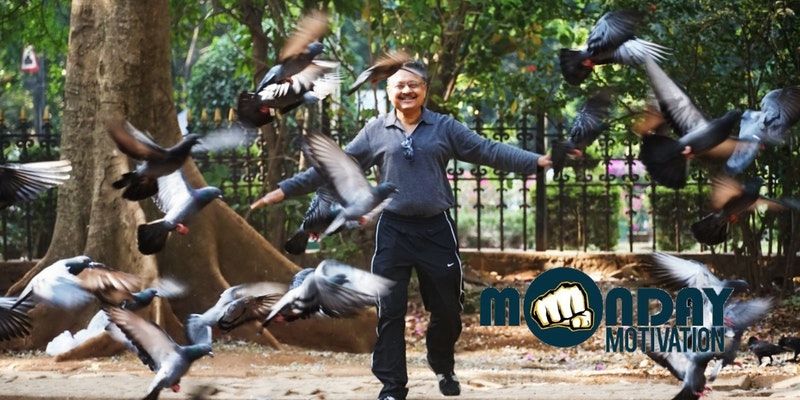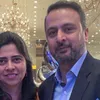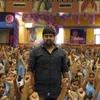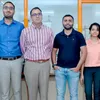Meet Parimal Gandhi, the four-time cancer survivor who still hasn't lost his sense of humour
A four-time cancer survivor, Parimal Gandhi has had to deal with an eye disorder, cardiac bypass, diabetes, and hypertension, and still thinks his is a life well lived so far.
How would you react if you were told that you had cancer, an eye disorder, heart issues, diabetes, and hypertension? With sadness? Contempt? Disdain towards life? According to Parimal Gandhi, an HRD trainer and a four-time cancer survivor, laughter can be the best ally when life throws you a curveball.
He should know a thing or two about curveballs, given that he has faced a multitude of them over the years. Since 1974, Parimal has had to deal with health issues that have led him to travel halfway across the world for solutions, relying on his fate, determination, and kindness of strangers.
He has written about the trials and tribulations of his life in his autobiography, Can Surmount, insisting that “there is a lot of grammar to this poetry of a life that I’m living.”
In this interaction with SocialStory, the 66-year-old recalls the challenges he has faced over the years and how he remains unfazed and hopeful despite them all.

Parimal Gandhi is a four-time cancer survivor
Dealing with dystrophy
Born in Ahmedabad in 1953, Parimal comes from a family of accountants, who were amateur singers and artistes as well. He remembers his childhood days fondly – learning how to play the piano, enjoying ballroom dancing with his sisters, and waking up to his father’s singing.
But life did not remain idyllic. At the age of 21, Parimal was diagnosed with bilateral corneal dystrophy — a rare hereditary disorder that leads to the clouding of the cornea in both eyes, hampering vision. This diagnosis sounded the death knell to his aspirations.
Parimal recalls the hopes and dreams he had fostered for his career: “I wanted to join the Air Force and become a pilot but my impaired vision ensured that that didn’t happen. Also, I won the National Science Talent Search Scholarship so I was planning to be a research chemist and had the funding to go all the way to PhD. I wanted to be a chemical engineer and start my own chemical plant.”
He had already completed three out of five years of bachelor’s in Chemical Engineering when he had to drop out to pursue English Literature. Because of the dystrophy, he was unable to study for the exams, but his wife and friends helped him with the preparation by reading out to him.
He won a gold medal.
Battling cancer
His first attempt at getting a corneal transplant had failed. Just as he was making arrangements for a second attempt, Parimal was diagnosed with Hodgkin’s disease, a type of blood cancer that starts in the lymphatic system. This was in 1984, 10 years after being diagnosed with dystrophy.
But Parimal did not harbour fear, and says his life doesn’t have room for negative emotions.
“I have a very practical approach to this whole thing – what is this problem and can I do anything to solve it. If I can’t, I’ll find somebody else who can solve it for me,” he says.

Parimal Gandhi getting cancer treatment
But not everyone shared his optimism and Parimal’s family crumbled under the news of his diagnosis.
“It is really sad that a number of cancer patients have to console their family members. So, the first time that the cancer occurred, my whole family was called back and there was a funeral-like atmosphere in the house. I had to scold them, saying, ‘do all this when I’m dead. I’m still alive.’”
‘Gods in machines’
Being pragmatic, Parimal had begun to find solutions to his problems. That’s when people, whom he calls ‘Gods in machines’, came into his life and rescued him. He got to know of a Hungarian engine driver-turned-ophthalmologist who was in Ahmedabad for a conference. After meeting Parimal, the doctor invited him to the US and assured him that his vision would be restored.
However, Parimal didn’t have enough money to go to the US nor get the surgery done. That’s when Rotary International, which he had been a member of, offered him an exchange programme, enabling him to fly to the US.
While he was being hosted by Rotarian families, one of them noticed that he had been reading with a magnifier. Upon enquiring, they got to know about his conditions and financial issues. They instituted a ‘Parimal Gandhi Fund’ and within two days, collected the fees for the surgery, which was $8,000.
But that was not the end of his string of beautiful surprises. Upon reaching the hospital, Parimal recollects,
“First it was the anaesthesiologist Dr Mahendra Patel from Gujarat. He said ‘Look, you’re like my younger brother. You’re from the same state as I am. I’m not going to charge you. I would have charged you $1000’. Dr John Alpa was smiling behind him. And Dr Patel said that Dr John Alpar was smiling because he was not going to charge me either.”
Now not only was his transplant made free of cost, he had enough money leftover to get treatment for his cancer in the US.
“Different people have come up at different times and they played a role far greater than what one would expect. In 1984-85, I linked up with a cousin of mine who had her husband’s three kids and two sisters living with her in Houston. And when I look back, I wonder how she managed to put up with one more person, that too someone undergoing treatment, getting nauseous, and feeling so horrible all the time. But she put up with me,” Parimal says.
Finding happiness
But all the kindness and support Parimal received did not stop the cancer from recurring in 1994 and 2004. In 2018, he was diagnosed with cancer of the bladder, the last ultrasound of which shows no sign of its presence. He also had to undergo a cardiac bypass surgery in 2010, and continues to manage his diabetes and hypertension.

Parimal Gandhi at Machu Picchu, Peru
So, what still keeps him going? Says Parimal, “My sense of humour, without which I could not have lived a life that I have lived. I refuse to take these things seriously. I will put myself in the hands of the best doctor and then be myself.”
Ill health also did not stop him from pursuing his love for travel. Parimal has travelled across India and much of Europe, North America, and South America.
“Travelling is an island on which I get on to keep the sharks away,” he quips.
His work as an HRD trainer also keeps Parimal busy—something which he gravitated towards in college when he coached himself into public speaking and received an opportunity to teach others.
He has trained over a lakh participants and 1,500 trainers globally for Fortune 500 companies, along with the former President of Mexico Vicente Fox Quesada and his cabinet. Despite having periodic episodes of medical emergencies and undergoing treatments for his cancer and debilitating diseases, he refuses to quit working.
“It’s up to me to keep my life worth living. Hospitals don’t do that. They just make sure you don’t die. And my work keeps me alive,” Parimal says.
So, would he change anything about his life if given a chance? Parimal says no, underscoring that the challenges his life presented made him who he is. He goes by the mantra that ‘you’re not just your body, you’re far beyond that’.
As he writes in his autobiography, Can Surmount,
“Life throws challenges my way. I accept them without demur. I then wrestle with them using all my resources. I have learnt to enjoy these trials while continuing to do what I want to in the other areas of my life. I never ask, ‘Why me? Why repeatedly? Why so much?’ I accept these as tests, as gifts, as prasad. And I have chosen to live my life fully. I will not let it live me.”
(Edited by Evelyn Ratnakumar)








